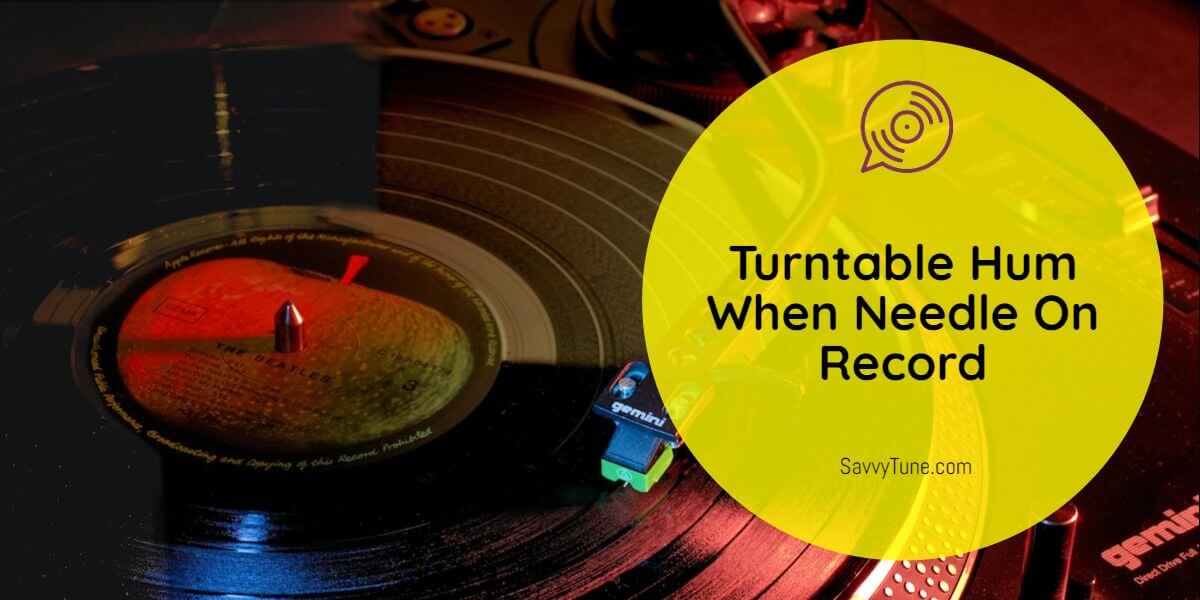It’s a Saturday morning. You went downstairs to play some good old record of yours. Then you hear a humming sound as you place the needle on the vinyl disc.
You see, there’s nothing more annoying for audiophiles like us than hearing our turntables hum while listening to our favorite records. Like a pesky mosquito that buzzes in our ears, that unwanted sound could be a real joy killer.
So why does the turntable hum when the needle is on record?
Uncalibrated transport screws and faulty headshell wires connection are major suspects why turntables hum. Moreover, ground loops, vibrations from other devices, and an electromagnetic leak could likewise make record players produce nasty sounds.
Let’s have an in-depth look at the reasons why turntables hum and how we may be able to fix them.
Find Out Where the Hum Is Coming From
Knowing exactly where the hum is coming from will help you find out what’s causing your turntable to produce unwanted sounds. More often than not, it’s either the speaker generates the hum or the turntable itself.
Let’s determine the source.

Is the Hum Coming From the Speaker?
One way to find out if the hum is coming from the speaker is by cranking up the volume of your turntable. It’ll be easier to know if there’s no record playing.
You can tell for certain that the hum is coming from the speaker when the noise gets louder as you increase the volume of the record player.
Another way to determine if the speaker is the culprit is by disconnecting the turntable and then connecting another device (e.g. television or CD player) to the speaker. If you’re still getting the same noise, then you may conclude that the speaker is the problem.
Users also read: Fluance RT82 vs. RT83
Is the Hum Coming From the Turntable?
If your speaker isn’t causing the issue—meaning it’s in top shape—then you can begin inspecting the vinyl record player itself.
Mechanical issues within the turntable and faulty wire connection are the most common reasons why the turntable hums when the needle is on record.
A ground loop and external vibrations are also suspects for this trouble. Likewise, humming due to electromagnetic leaks shouldn’t be overlooked.
We’ll have a closer look at these issues one at a time in the following section.
Why Does the Turntable Hum When the Needle Is on Record?
Here are some of the most common reasons why turntables hum when the needle is on record.
Uncalibrated Transport Screws
We’re not sure how familiar you are with your turntable. However, the mechanical components of your device could cause it to produce noise. No, we’re not talking about the humming sound coming from your speakers, but rather from the record player itself.
So if you’re getting that sound, chances are the transport screws of your turntable need some adjustments.
Transport screws (a.k.a. transit screws) are meant to protect the vinyl player when it’s being transferred from one place to the next. They prevent the turntable from moving and rattling during shipment.
That said, adjusting these screws might help you get rid of the hum. However, you may have to rework their tightness by means of trial and error.
That’s because, for some models, the hum will go away when you tighten the transport screws, while other turntables will respond when you loosen them.
In some brands, you can find transport screws by lifting the platters off. However, if locating the screws becomes difficult, check the product manual or contact the manufacturer for assistance.
Faulty Headshell Wires Connection
Headshell wires that aren’t tightly connected to the cartridge could likewise cause your turntable to hum. To make things easier, it’s best to disengage the headshell from the tonearm first before you check the wires.
If you suspect that some of the headshell wires are loose, you can tighten the connection either by pressing the wires with long-nose pliers or sliding them back into the cartridge. However, you have to be careful doing this because these wires are sensitive.
In addition, you may also want to clean the contacts of the headshell with a cotton swab and isopropyl alcohol before attaching it back to the tonearm.
Lastly, try removing and then reattaching the stylus to make sure that it’s also securely connected.
Ground Loops
Having ground loops is not fun. They sound so awful!
Ground loops happen when you plug two or more devices such as a turntable and an amplifier into different power sources while linking them together via other paths (e.g. audio cables) on the ground. This setup often produces ground loops or humming sounds.
Most, if not all, turntables come with a device called the ground wire. This piece of equipment is designed to prevent turntables and amplifiers from producing ground loops.
You can utilize a ground wire by attaching one end to the grounding terminal of the turntable while the other end goes to the grounding terminal of the amplifier.
Most ground terminals are usually located at the back of turntables and amps. Just look for the marking that says “Ground” or “GND.”
Vibrations From Other Equipment
Another reason why your turntable produces noise is that you have other electronic equipment sitting next to it. It could be an amplifier or any electric-powered device that you placed on the same surface where the vinyl player sits.
You see, the stylus is designed in such a way that it could pick up vibrations easily. That said, the vibrations from whatever device near your record player might be causing the problem.
So, try isolating your turntable by getting rid of any nearby equipment and placing it on a separate display rack.
Electromagnetic Leak
Oftentimes, you’d know that stray electromagnetic fields are leaking from your turntable when you hear buzzing sounds as you place the cartridge halfway to the vinyl disc.
The turntable’s motor could be sending unnecessary electric charges that cause the cartridge and the stylus to react.
Users also read: Best Cartridge for Rega Planar 6
One quick way of stopping the leak is by using the foam mat that comes with your turntable or a silicone-made platter mat. These tools will help dampen the vibrations caused by the electromagnetic leak.
However, if the humming sound persists, you can always contact a trained technician to sort the problem for you.




